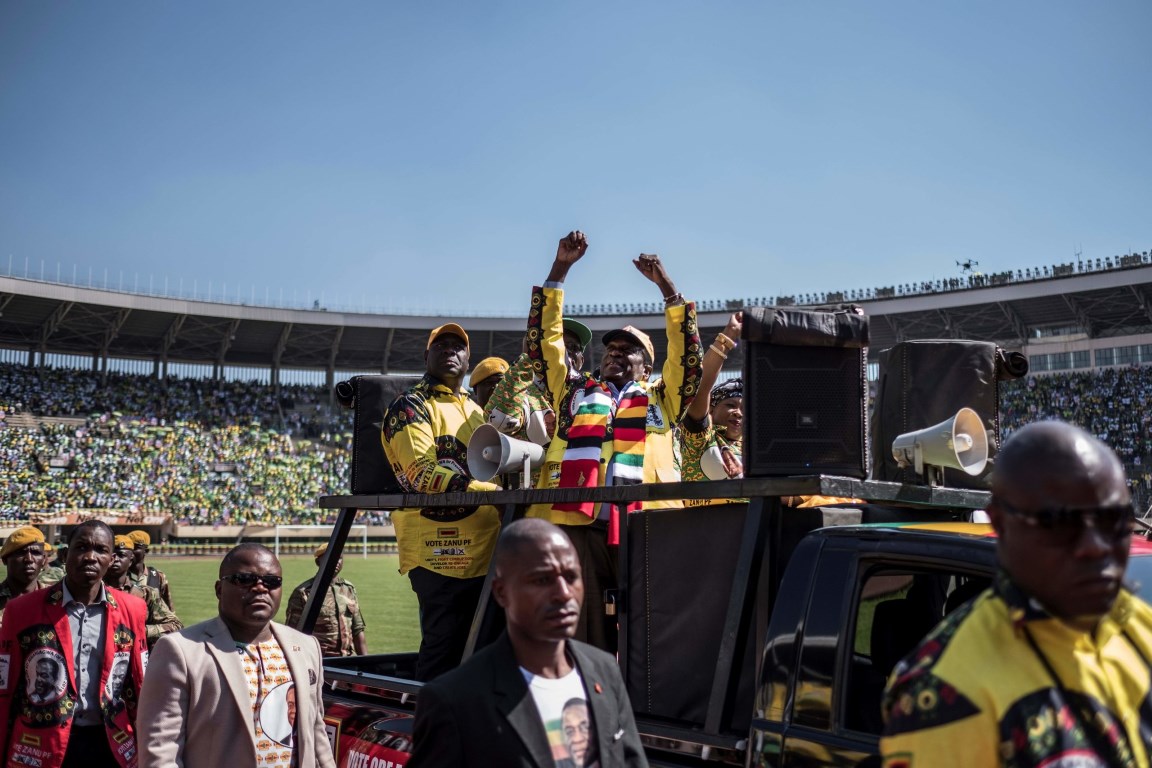Zimbabwe elections 2018
July 30, 2018 | Expert Insights

Zimbabwe’s general elections held on 30th July 2018 will elect the President and members of both houses of Parliament. Pre-election polls give President Mnangagwa a narrow lead over his rival Mr.Chamisa from the MDC Alliance.
Background
For multiple decades now Zimbabwe has struggled to feed its own people due to severe droughts and the effects of a land reform programme which saw the seizure of white-owned farms redistributed to landless black Zimbabweans which led to sharp falls in production.
In November 2017, the nation has been gripped in political crisis. Former Vice President of Zimbabwe, Emmerson Mnangagwa, alleged that President Robert Mugabe, had threatened his life. Mnangagwa, who was sacked by the President in November 2017, then fled to South Africa.
Shortly after the Vice President left the nation, the country’s army commander Constantino Chiwenga said on that the military would act if purges against former war liberation fighters did not cease. In addition, soldiers took over the headquarters of the state broadcaster ZBC and blocked access to government offices. However, the army insisted that this wasn’t a coup to replace Mugabe from power.
After being in power for 37 years, Robert Mugabe resigned as the President of Zimbabwe with immediate effect in November 2017. For nearly eight days, he had resisted growing calls for resignation. Even party leaders had begun calling on him to step down to deescalate the situation.
On 10th July, Zimbabwe launched its space agency to enhance the use of space technology for sustainable development. Analysts feel that strategically investing in Space technology has given President Mnangagwa a head start in the presidential elections.
The election campaign for the 30th July general elections in Zimbabwe has been a ray of hope for it’s farmers as well as the distressed economy. The main contestants for the post of the President are ZANU-PF leader President Mnangagwa and the MDC party led by Nelson Chamisa. However, the elections are not behind on sparking violence and resorting to mudslinging.
Analysis
President Emmerson Mnangagwa, of the ruling ZANU-PF party, and Nelson Chamisa, of the opposition MDC Alliance, are seen as the top two contenders. However, for the first time, since the end of white minority rule in Zimbabwe, it has witnessed 23 candidates-19 men and 4 women, who are eyeing for the post of president. Moreover, a presidential runoff will be held on September 8 if none of the candidates secures more than 50 percent of the votes. The official results are expected to be released by Saturday.
Millions of Zimbabweans are heading to the polls to vote in the country's first elections since independence in 1980 without the name of long-time leader Robert Mugabe on the ballot. More than five million Zimbabweans have registered to take part in the landmark elections and pick their next president and members of parliament. A total of 10,985 polling stations have been set up across the country.
On the eve of the vote, Ex-President Robert Mugabe said he would not back his successor in the polls, accusing the ruling party's leadership of "tormenting him". "I can't vote for ZANU-PF. I can't vote for those in power. I can't vote for those who brought me into this state," Mugabe said on Sunday. He added that he would vote for 40-year-old Chamisa.
Elections observers from the European Union and the United States have also been allowed to monitor the vote - the first time since 2002. “This is a critical moment in Zimbabwe’s democratic journey,” said Ellen Johnson Sirleaf, the former Liberian president and a leader of one of the international observer missions. “The elections today provide an opportunity to break with the past,” Sirleaf said at a polling station in a school in Harare. “The lines and voter enthusiasm we are seeing this morning must be matched by an accurate count and their choice must be honoured.”
Mr. Mnangagwa has tried to remake Zimbabwe’s image by portraying the government as business-friendly. But to revive the economy, it would help if Mr. Mnangagwa can carry out a fair election — one that will satisfy international observers and Western governments enough for Zimbabwe to qualify for loans from the IMF, the World Bank and other international creditors. Zimbabwe’s rulers know that a fraudulent poll would block the country’s reintegration into the international community and deny them the huge bailout package needed to avoid economic meltdown.
Counterpoint
Opposition parties and election observers have raised questions about the integrity of the voter rolls. There is increased ambiguity on how voting will take place on Election Day, especially in the governing party’s rural strongholds, where widespread election fraud has ensured victory for Mr. Mugabe’s party in past votes.
Assessment
Our assessment is that compared to previous elections, the campaigning this time has been relatively peaceful and this gives hope to Zimbabwe’s democratic journey. Although polls suggest a victory for Mr. Mnangagwa, we feel that considering that the election are conducted in a free and fair manner chances of him obtaining a clear majority could be reduced. We believe that Zimbabwe’s political leaders must ensure that they present a long-term solution for its economic problems, albeit with international aid.








Comments